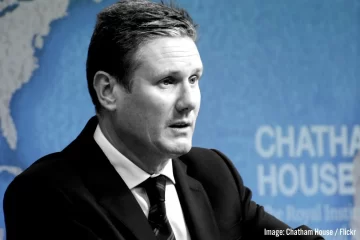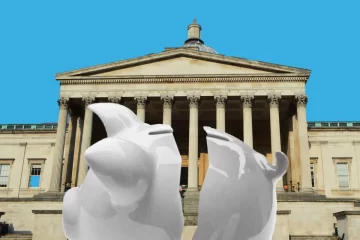Every crisis in life makes some and breaks others. So it is with the smears of the bourgeois establishment on Jeremy Corbyn and the movement behind him. These pressures too are breaking some whilst steeling others.
Take, for example, Joe Smallman’s recent article for politics.co.uk. In his piece, the author asks us to consider the “unthinkable” prospect of “Corbynism without Corbyn”.
At first, the suggestion sounds fairly harmless, as the author recognises that since the last general election the “naysayers have been silenced” and the party is “unafraid of being radical”. But this fact, the author reassures us, should give us confidence in the “project as a whole” rather than just “the personality of its leader”.
The problem, Smallman asserts, is that Corbyn is just not up to the job. “Over the last few weeks, it seems he has finally found his limit,” our commentator states. “Corbyn’s reactions to the Russian poisoning in Salisbury and reports of anti-semitism in the Labour party have shown fundamentally flawed political instincts.”
His conclusion: “Corbyn should step down and let another left-wing candidate take his place – one without the baggage of the current incumbent.”
But what Smallman fails to notice is that the attacks against Corbyn and our movement this year are substantially no different from the attacks being made last year or the year before. Despite facing similar criticism from his opponents since day one, Labour’s Corbyn-led general election campaign turned out to be its most successful for decades (in terms of percentage swing).
So why should now be any different? Why, now, should Corbyn resign in the face of yet another round of smears and sabotage?
The article’s main proposal signifies a complete crumbling under the pressure of the establishment media, politicians, banks and big monopolies, who are all fundamentally opposed to Corbyn. In the space of a few paragraphs, the author jumps from calling Corbyn’s critics “naysayers”…to becoming one himself!
Why is Corbyn under pressure?
When you take a step back and look at the situation as a whole, you can see the real aim of the wrecking behaviour of the capitalist agents within the Labour Party. These right-wing MPs and councillors are no different from Tories. They are aided, of course, by a scattering of sycophants whose eyes shine at the prospect of a cushy political career.
The Marxists have explained from the beginning that behind their criticisms of Corbyn in the name of “electability” and “respectability” lies a fundamental hatred – a class hatred against the mass Corbyn movement. This contempt reflects the complete incompatibility of the interests of the privileged and those of the oppressed.
This was clearly revealed when Tony Blair put his hands up and said he doesn’t care if Corbyn’s electable, he still will not support a Corbyn Labour government.
This is only a more obvious reflection of the intentions and thinking amongst the Labour right wing. They pay lip-service to anti-austerity struggles, but when push comes to shove they’ll oppose nationalisation and reversing cuts. Nobody amongst the Labour grassroots has any doubts now that these Blairites are a big business Fifth Column inside the Labour Party and the trade union movement.

Will changing the leader help the movement?
The essence of Joe Smallman’s article for politics.co.uk, is to suggest a panacea for the Corbyn movement: to replace the current leader with a friendlier face.
This move would apparently provide evidence that Labour is “not a cult of personality”, but a “democratic mass movement”. We must “rejuvenate” our movement, Smallman asserts; we can’t keep going with a man who “seems politically tone deaf” in response to “valid criticism from his MPs”. As if the attacks on Corbyn have any genuine basis in reality and are not just fueled by fundamental political differences!
If left-wing figures can’t hold the line in the face of trivial smears by the Murdoch media and the Tory party, one has to wonder what it’ll be like when a Corbyn government – as it attempts to introduce socialist policies – faces sabotage and a full on war by the international banks and monopolies.
No demand exists out of time and space. We always have to consider carefully who is putting forward a demand, and for what purpose. Who exactly is proposing the prospect of “Corbynism without Corbyn”?
To propose a change of leadership right now means to play into the hands of the Woodcocks, Streetings and Umunnas of the party. They will see it as an opportunity to claw the party back into safe hands for big business, and they will use any means at their disposal, legal or not, to achieve this.
We must not forget that these means – conspiring to cause maximum media damage, expelling left-wing members, and preventing them from voting – have been used regularly and recently.
Smallman suggests that these right-wing Labour MPs have “valid criticisms”. But we have to take the words of these well-to-do ladies and gentlemen in the PLP with a giant pinch of salt.
Within the space of months after the first leadership contest of 2015, they turned from highlighting the necessity of ‘some cuts’ to becoming such passionate ‘fighters’ against austerity. After the ‘chicken coup’ ground to a halt, they suddenly became the loudest proponents of ‘unity’ (i.e. they, as losers, being given frontbench positions).
Ultimately, the proof of the pudding is in the eating. It is clear that the Labour right-wingers are closer to the Tories in their background and outlook. We must therefore be extremely wary of any ‘advice’ from the Woodcocks, Streetings and Umunnas of the Party – let alone of any “valid criticisms”!
The disagreements with Corbyn and the grassroots movement from these Blairites are based on nothing less than pure class interests – the class interests of the bosses and bankers that they really represent.
As long as the movement threatens the power and privileges of these people, changing the person at the top will alter nothing fundamentally. It is not Corbyn as a person that the bourgeoisie and their mouthpieces despise – it is what he and our movement represent.
Why not reselect the careerists instead?
Smallman calls for a ‘face-lift’ of the party by changing its leader. But if we’re looking to ‘face-lift’ the Labour Party, why not start with those who are clearly holding our movement back the most?
The Blairite wing of the party has attacked the working class for 13 years, and continues to do so where it still has power – for example, in local councils. Their policies and proposals have nothing to do with the aspirations of the Corbyn movement. These right-wing relics are a complete dead weight on it.
On a side note, it is a great irony that those who call for Corbyn to go in the name of ‘democracy’ in the same breath condemn the demand for the mandatory reselection of MPs!
Time and time again it has been proven that there can be no unity with these characters. Clearing these types out of the Parliamentary Labour Party and from their positions as councillors – through a democratic process of mandatory reselection – will be far more effective in winning Labour the support of the working class than any change of leader.
Responding to the supposedly “valid criticisms” of Woodcock and co. by suggesting the need for a “face-lift” only plays into the hands of the right wing, preparing the ground for a catastrophe. What should really be on our mind is to reclaim the party at every level.
The fight to reclaim the Labour Party would mobilise the tens-of-thousands who have joined in the last few years to support Corbyn and his programme. Meetings of dozens would become meetings of hundreds, and the Party will be far more popular as it becomes fully democratic, with people having a genuine sense of ownership over it.
Fragility of the ‘left’ leaders
Ordinary grassroots Labour members will have no doubts about the real nature of the Labour right wing and their ‘advice’. But things get slightly trickier if we look at the advice given to us by some of the leading ‘left’ voices in the Labour Party. After all, they seem more honest at first glance, given that they have invested more in the Corbyn movement.
The road to hell, however, is paved with good intentions. One only has to look at the ‘advice’ Owen Jones gave in the aftermath of Brexit and the Blairite ‘chicken coup’. With friends like this, who needs enemies?

This wavering from the self-proclaimed leaders of the left isn’t accidental. Leon Trotsky accurately summed up the psychology of the left reformist leaders, when talking about the POUM – a radical left party during the Spanish Civil War.
The POUM spoke about socialism and Marxism, but did not translate these radical words into revolutionary deeds. They waved hammer-and-sickle flags, and talked about the dictatorship of the proletariat. They were far more radical than today’s Labour Party. But even they succumbed to pressures of the capitalist class.
What Trotsky said of the POUM leaders applies equally to those left-wing commentators who today spend their lives trapped in the bubble of bourgeois journalism and establishment politics:
“Politics must conform to the basic laws of revolution… to the movement of classes in struggle and not the fears and superficial prejudices of the petty bourgeois groups… the line of least resistance in a revolution is the line of worst failure. The fear of isolation from the bourgeoisie leads to isolation from the masses. Adaptation to the conservative prejudices of the labour aristocracy means the betrayal of the workers and the revolution. Excessive prudence is the most fatal imprudence. This is the main lesson of the collapse of the most honest political organisation in Spain: the POUM.”
The need for a revolutionary tendency
Nobody is immune to the pressures of capitalist society. However, a genuine understanding of how capitalist society works is vital in resisting such pressures. The attacks on our movement are far easier to resist if we understood the big business class interests that lie behind these attacks.
Marxism is a scientific set of ideas, which precisely seeks to understand capitalist society and the dynamics of class struggle. The advantage of Marxism over reformism (the idea that capitalism can be gradually reformed) can be summed up as the advantage of foresight over shock, confusion and astonishment.
Above all, we need a bold leadership armed with such an understanding. The question of leadership is even more important in difficult times, when the going gets tough. It is the difference between holding the line and a complete rout.
Smallman’s article is a warning to the Corbyn movement. It is not good enough to have a leadership of soft political commentators who are blown whichever way the wind blows. This will only prepare the way for catastrophes.
We have to rely not on the ‘advice’ of the Woodcocks, Streetings and Ummunas, but on the strength of the organised, united working class. That is in the ABCs of socialism.
The past year has clearly shown that a Corbyn-led Labour Party is electable – because of our bold left-wing programme, which resonates with the mood of anger in society.
The more “electable” Corbyn becomes; the closer he gets to being in Downing Street; the more radical the ideas he puts forward, the more bitter and ferocious the attacks from the establishment will be.
The main problem that holds our movement back is the relics who supposedly ‘represent’ us at the local and parliamentary level; representatives who are still mostly a hangover from the Blair era. When a Corbyn Labour government comes to power, these traitors will turn on him as quickly as soon as their masters in the banks and the media give the signal.
We have to have a sense of urgency in replacing these careerists with militant class fighters. Above all, we need to prepare ourselves for the earth-shattering events that are on the horizon – events that will transform the situation in the Labour Party and the country as a whole.
When these events come, the likes of Smallman and co. are unlikely to stick with the working class movement. We need a bold leadership that can show the way forward.
Author: Maciej Krzymieniecki, Swansea Marxists



